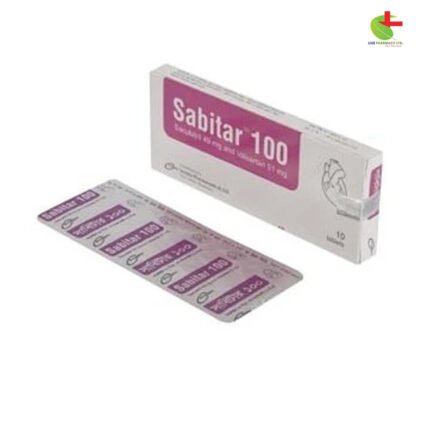Sabitar 50
450.00৳ Strip
- Sacubitril/Valsartan is used to treat chronic heart failure with reduced ejection fraction.
- Reduces the risk of cardiovascular death and hospitalizations for heart failure.
- Also indicated for pediatric heart failure with systemic left ventricular systolic dysfunction.
- Inhibits neprilysin and blocks the angiotensin II receptor to improve heart function.
- Available at Live Pharmacy.
 Brand
Brand
|
Incepta Pharmaceuticals Ltd |
|---|---|
 Generics
Generics
|
Sacubitril + Valsartan |
 Type
Type
|
Tablet |
Indications
Sacubitril/Valsartan Sabitar is prescribed for:
- Reducing the risk of cardiovascular death and heart failure-related hospitalizations in patients with chronic heart failure (NYHA Class II-IV) and reduced ejection fraction.
- Treating symptomatic heart failure with left ventricular systolic dysfunction in pediatric patients (aged 1 year and older).
- It is typically used alongside other heart failure therapies, replacing ACE inhibitors (ACEi) or other ARBs (Angiotensin Receptor Blockers).
Use only as prescribed by a registered healthcare provider.
Pharmacology
This combination tablet contains Sacubitril, a neprilysin inhibitor, and Valsartan, an angiotensin II receptor blocker (ARB). Sacubitril, through its active metabolite LBQ657, inhibits neprilysin, which increases beneficial peptides like natriuretic peptides. Valsartan, by blocking the AT1 receptor, inhibits angiotensin II effects, reducing aldosterone release and offering cardiovascular and renal benefits in heart failure.
Dosage & Administration
For Adult Heart Failure:
- Start with 49/51 mg twice daily, then increase to 97/103 mg twice daily after 2-4 weeks, as tolerated.
- For patients with severe renal or moderate hepatic impairment, reduce the starting dose to 24/26 mg twice daily.
For Pediatric Heart Failure:
- Adjust doses based on weight and age, starting from 1.6 mg/kg and increasing as tolerated.
Important: Always follow the doctor’s prescribed dosage and schedule.
Interaction
- ACEi: Avoid use with ACE inhibitors or aliskiren in diabetic patients.
- Potassium-Sparing Diuretics: May increase serum potassium levels.
- NSAIDs: Risk of renal impairment may rise.
- Lithium: Risk of increased lithium toxicity.
Contraindications
This medication is contraindicated in:
- Patients allergic to any of the ingredients.
- Patients with a history of angioedema from ACE inhibitors or ARBs.
- Concomitant use with ACE inhibitors (within 36 hours).
- Use with aliskiren in diabetic patients.
Side Effects
- Common: Angioedema, hypotension, impaired renal function, hyperkalemia, dizziness, and cough.
- Serious: May lead to severe hypotension or kidney problems; monitor renal function closely.
Pregnancy & Lactation
- Pregnancy: Not recommended during pregnancy due to potential risks to the fetus.
- Lactation: Unknown if excreted in breast milk. Use caution when breastfeeding.
Precautions & Warnings
- May cause severe allergic reactions (angioedema).
- Monitor blood pressure, kidney function, and potassium levels, especially in patients at risk of hyperkalemia.
- Not recommended in patients with severe hepatic impairment.
Use in Special Populations
- Pediatric Use: Safety has not been established for children under 1 year of age.
- Geriatric Use: No significant pharmacokinetic differences in elderly patients.
- Renal Impairment: Adjust dosage for severe renal impairment (eGFR <30 mL/min).
- Hepatic Impairment: Adjust dosage for moderate hepatic impairment; not recommended for severe hepatic impairment.
Overdose Effects
- Overdosage may result in hypotension. Symptomatic treatment is recommended. This drug is unlikely to be removed by hemodialysis.
Storage Conditions
- Store in a dry place below 30°C. Protect from moisture and light. Keep out of the reach of children.













Reviews
There are no reviews yet.